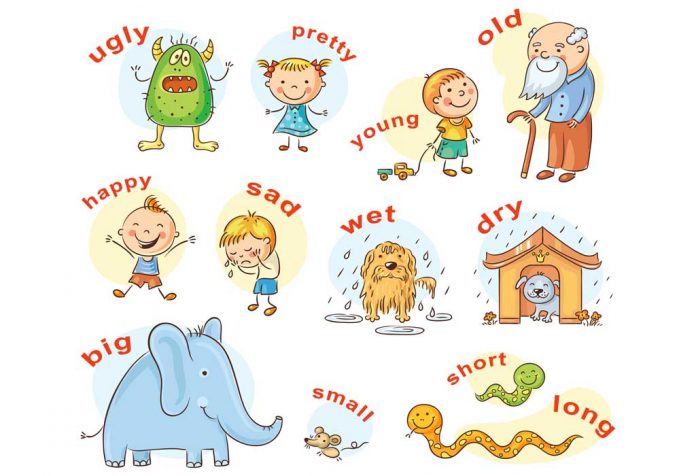Much of our communication involves describing things, shapes, sizes, feelings, events and other things. Having precise words for describing helps us communicate better. Children need to learn the meaning of describing words as early as possible to develop good communication skills. By learning to describe words they can explain things better or communicate their feelings well. In this article, we go through describing words for classes 1, 2 and 3. Use these words frequently and with the intent to build a habit of using the right describing word for the right thing in your child.
What Are Describing Words?
Descriptive words are used to describe something or to intensify the meaning of words. Describing words can be used to describe everything from a person to a place, situation, things, feelings and thoughts, etc. Use of the right describing words paints the right picture of what you are trying to convey. Describing words can also be used to intensify or dilute the meaning of other describing words. For example, when you talk about a person, you describe their height, expressions and other features. When you describe a place, you use a combination of describing words that convey both the nature of the place and your feelings about it.
Thank you for reading this post, don't forget to subscribe!
What Are The Types Of Describing Words?
In English, there are two ways to write describing words; adjectives and adverbs.
1. Adjectives
Adjectives are words used to describe nouns and pronouns acting as “subject” or “object” in a sentence. They give additional information about nouns or pronouns, such as shape, size, colour or other attributes. Examples include:
- He is tall.
- She is pretty.
- The car is blue.
- The food was spicy.
- She is an intelligent girl.
2. Adverbs
Adverbs are words that describe verbs. They describe things other than nouns and pronouns. They can also modify adjectives and other adverbs. The describing words examples include:
- He quickly climbed the wall.
- The stars were shining brightly.
- He is a quick learner.
- She behaved strangely at the party.
- She can sing melodiously.
List of Describing Words For Kids
Describing words and examples need to be studied to learn adjectives and adverbs. Here, we present a list of describing words for classes 1, 2 and 3:
Commonly Used Describing Words
Commonly used describing words are adverbs that give us a measure of time, place, degree, manner and circumstances. They are part of our everyday conversation. Here are 20 of the most commonly used words that children need to learn to build good communication skills:
| Amazing | Kindly | Usually | Terribly |
| Absolutely | Interesting | Sincerely | Commonly |
| Remarkably | Happy | Charming | Lovingly |
| Normally | Significantly | Delightful | Pleasurable |
| Quickly | Generally | Tremendously | Pleasing |
Describing Words to Describe Personality & Feelings
Every time we describe people, we use personality describing words that hint at one or more qualities of the person. The same idea applies to feelings- we often use more than one word to describe what we are feeling and going through. Here are some of the common descriptive words for personality and feelings:
| Personality | Feelings |
| Creative | Happy |
| Kind | Joyful |
| Cheerful | Ecstatic |
| Adventurous | Glad |
| Brave | Serene |
| Funny | Angry |
| Honest | Sad |
| Calm | Gloomy |
| Silly | Respectful |
| Loyal | Miserable |
| Proud | Moody |
| Nervous | Selfish |
| Clumsy | Grumpy |
| Friendly | Merry |
| Nice | |
| Inventive | |
| Lively | |
| Caring | |
| Helpful | |
| Wise | |
| Strong |
Describing Words to Describe Food & Colors
Children love eating different types of food and need to learn a variety of words to describe its taste and texture. The same applies to colours as they are related to learning, painting, segregating and playing. Here are describing words for food and colours:
| Food | Colours |
| Sweet | Red |
| Spicy | Yellow |
| Tart | Blue |
| Sour | Green |
| Bitter | Orange |
| Sharp | Purple |
| Pungent | Violet |
| Delicious | Pink |
| Yummy | Colourful |
| Peppery | Bright |
| Salty | Vivid |
| Savoury | Brilliant |
| Tangy | Vibrant |
| Bland | Colourless |
| Buttery | Opaque |
| Fresh | Dim |
| Fruity | |
| Nutty |
Describing Words to Describe Smell & Sounds
Smells are closely related to taste and have similar-sounding meanings in a few descriptive words. Sounds produce an entirely different sensation and have some words to describe the same. Here are frequently used descriptive words for smells and sounds:
| Sound | Smell |
| Loud | Aromatic |
| Noisy | Fishy |
| Quiet | Odorous |
| Silent | Piquant |
| Raspy | Scented |
| Melodious | Rosy |
| Flowery | |
| Stinky |
Positive Describing Words For Children
It’s important to regularly use good descriptive words to elicit positive thoughts and feelings in children. These words will later become a part of their inner voice that shapes their personalities. Here is a list of positive words your children should regularly use:
| Affectionate | Charming |
| Generous | Creative |
| Determined | Imaginative |
| Likeable | Diplomatic |
| Sincere | Helpful |
| Capable | Glittering |
| Productive | Motivated |
Descriptive Words That Begin With Letter ‘A’ To ‘Z’
Now that we know the essential descriptive words, we can go deeper into words children can learn over time. Descriptive words make it precisely express our thoughts, ideas or feelings. Children need to be aware of many such words to construct and communicate complex concepts as they grow older. Here are descriptive words from A to Z.
| Abandoned | Ambitious | Alert |
| Affordable | Arrogant | Amused |
| Adaptable | Beautiful | Brilliant |
| Baffling | Basic | Blushing |
| Busy | Bossy | Calm |
| Cunning | Clever | Captivating |
| Crisp | Casual | Creative |
| Daring | Dangerous | Dominating |
| Decent | Diverse | Divine |
| Deep | Eagerly | Effortless |
| Easily | Energetic | Exciting |
| Eccentric | Empty | Frequently |
| Flawless | Fabulous | Fine |
| Fancy | Fashionable | Fantastic |
| Good | Great | Giant |
| Glamorous | Grieving | Gentle |
| Glad | Heartfelt | Healthy |
| Hurry | Harmful | Hard |
| Humane | High-spirited | Idolise |
| Impossible | Idle | Improper |
| Illegal | Intriguing | Immoral |
| Jolly | Jovial | Joyous |
| Jarring | Jealous | Juvenile |
| Judicious | Kind | Known |
| Kinetic | Keen | Knowledgeable |
| Kingly | Kindred | Lovingly |
| Large | Lately | Lonely |
| Lucky | Legendary | Liberated |
| Majestic | Magnificent | Massive |
| Marginal | Merry | Moderate |
| Malicious | Nearby | Noble |
| Naughty | Native | Neutral |
| Natural | Needy | Nowhere |
| Ordinary | Outstanding | Organic |
| Orthodox | Overrated | Overhang |
| Omniscient | Protective | Periodically |
| Playfully | Precise | Peaceful |
| Productive | Popular | Queer |
| Quickly | Quietly | Quirky |
| Quarrelsome | Qualified | Radiant |
| Reliable | Rare | Remarkable |
| Romantic | Rampant | Reluctant |
| Striking | Speedy | Spirited |
| Sophisticated | Sleepy | Sly |
| Stylish | Tactical | Terrific |
| Talkative | Tempting | Tight |
| Tough | Tempt | Urgent |
| Unique | Unfriendly | Ugly |
| Unaffected | Unusual | Universal |
| Versatile | Virtuous | Vulnerable |
| Verifiable | Vigilant | Valuable |
| Voluntary | Valiant | Villainous |
| Wise | Whimsical | Wicked |
| Witty | Warm | Wealthy |
| Whole-heartedly | Wanted | Xenodochial |
| Xeric | Young | Youthful |
| Yawning | Yummy | Zealful |
| Zealous | Zestful | Zoological |
How Can You Help Your Child Learn Describing Words Easily?
Language develops slowly over the years as it takes time for children to add words to their vocabulary. While some describing words are best learnt through practice via adjective games, most can be used in everyday conversations. To make it easy for them to remember the words, you can introduce them in the form of games such as “describe yourself” in one word or sentence that uses a new describing word. You can also ask them to describe different flavours and sounds when the opportunity presents itself. Feelings and emotions take longer to recognise and label. However, they can learn through stories and experiences.
When it comes to learning descriptive words, practice and variety are key. While it is impossible to learn all the words in a short time, frequent use of words makes it easy for the kids to grasp the meaning of words and use it in sentences. Over the years, your child will add dozens of new words to their vocabulary as their communication refines.
Also Read:
Words that Start with Ch for Kids to Learn
Words that Start with Dis for Children
Compound Words for Kids with Types and Examples











